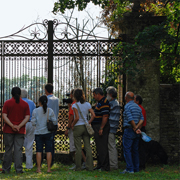
Outstanding places [Luoghi di valore. Valori del luogo]
International Landscape Study Days
2009, sixth edition
5th-6th February
Twice, in 2007 and 2008, we have invited the inhabitants of the Province of Treviso to nominate Outstanding Places, and the response has revealed an astonishing wealth of concern, sensitivity and critical intelligence. It has produced over three hundred different places that someone has judged as of outstanding value and has presented evidence to support their opinion; over two hundred different people who have taken the trouble to get involved, choose a place and explain the reasons for their choice. A significant segment of society has dedicated time and effort to considering questions that might appear to be a long way from everyday concerns, from the things that “matter”, but which in actual fact are highly relevant, urgent and topical and might even be described as of central importance to our civilization. This intriguing cultural experience has brought us into contact with an extraordinarily wide range of people and of sources and documents, all of which have helped us to an understanding of the fact that “place” is not something that “surrounds” a person or a community, nor is it an optional environment; on the contrary, it is a constituent part of our very lives, an essential aspect of the human condition. So we now have a substantial number of places/people, place/person intersections to discuss. The documentation assembled over the last two years, the places nominated (illustrations will be displayed in Palazzo Bomben during the Study Days), interviews, site visits and meetings combine to show how our “need of place” and, conversely, the “loss of place” are phenomena of a universal nature, experienced by people of all cultural and social backgrounds. It is a wealth of accumulated knowledge that not only allows us, but also urges us to try and move further and deeper into the issues. So the subject we shall be discussing during the Study Days is the crucial question of the value of place. We therefore invite all those who have nominated places to join us for these open, seminar-type discussions, which will also involve representatives of other natural and human sciences. We expect these next Study Days to lead to a step forward in our programme, new ideas for the third invitation to nominate outstanding places (already underway), new ways of processing the results and the launch of a new strategy for publicizing both the results and the questions raised by this collective research in ever wider circles of cultural and political responsibility.
